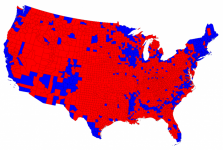The Return of Street Corner Conservatism
Column: Donald Trump and the political philosophy of the Deplorables
BY: Matthew Continetti
December 23, 2016 5:00 am
Richard Nixon was plotting his 1968 presidential campaign when he received a letter from a high school English teacher in Pennsylvania. The correspondent, a young man named William F. Gavin, wasn’t certain Nixon would run. But he sure wanted him to. “You can win,” Gavin wrote. “Nothing can happen to you, politically speaking, that is worse than what has happened to you.”
Gavin cited Ortega y Gasset to explain why Nixon was uniquely suited to lead during the violence and uncertainty of the late 1960s. “You are,” he went on, “the only political figure with the vision to see things the way they are and not as Leftist and Rightist kooks would have them.”
The forceful and eloquent style of Gavin’s prose impressed top Nixon aide Patrick J. Buchanan. Gavin soon joined the nascent campaign, beginning a career writing speeches for the thirty-seventh president, for Senator Jim Buckley of New York, for Ronald Reagan, and for congressman Bob Michel, as well as composing novels, nonfiction books, and journalism. Gavin understood well the political realignment that brought city- and suburban-dwelling white working class ethnics—Irish, Italians, Greeks, Pols, and Slavs—rather tentatively into the Republican camp. “The Nixon aide who understood the Catholic opportunity best,” Buchanan wrote later, “was Bill Gavin, who had grown up Catholic and conservative, his views and values shaped by family, faith, and friends.”
I have been thinking about Gavin lately because his life and thought so perfectly capture the conservatism of Donald Trump. When you read Gavin, you begin to understand that the idea of Trump as a conservative is not oxymoronic. Trump is a conservative—of a particular type that is rare in intellectual circles. His conservatism is ignored or dismissed or opposed because, while it often reaches the same conclusions as more prevalent versions of conservatism, its impulses, emphases, and forms are different from those of traditionalism, anti-Communism, classical liberalism, Leo Strauss conservatism in its East and West Coast varieties, the neoconservatism of Irving Kristol as well as the neoconservatism of William Kristol, religious conservatism, paleo-conservatism, compassionate conservatism, constitutional conservatism, and all the other shaggy inhabitants of the conservative zoo.
Trump has always been careful to distinguish himself from what he calls “normal conservative.” He has defined a conservative as a person who “doesn’t want to take risks,” who wants to balance budgets, who “feels strongly about the military.” It is for these reasons, he said during the campaign, that he opposed the Iraq war: The 2003 invasion was certainly risky, it was costly, and it put the troops in a dangerous position, defending a suspicious and resentful population amid IEDs and sniper attacks. The Iraq war, in this view, is an example of conservative writers and thinkers and politicians following trains of logic or desire to un-conservative conclusions.
Nor is it the only example. Fealty to econometric models, Trump says, has led many conservatives as well as liberals to embrace a “dumb market” that gives mercantilist powers in Asia advantages over U.S. industry and labor. The rush to pass comprehensive immigration reform as a result of the elite consensus that immigration is an unmitigated good set the Republican Party leadership against its own voters. The desire to restrain entitlement spending through cuts rather than prolonging the lifespan of these programs through economic growth demoralizes Republican voters who count on their checks to arrive each month.
Indeed, Trump was so at variance with the mainstream of the intellectual conservative movement on these issues that he modified his political identity. “I really am a conservative,” he said last February. “But I’m also a commonsense person. I’m a commonsense conservative. We have to be commonsense conservatives. We have to be smart.” Common sense in this understanding is opposed to the theoretical and academic analysis that has led conservatives to nonsensical and unpopular positions because they are beholden to speculative conclusions or to creedal dogma.
Trump’s politics are grounded not in metaphysics but in what he understands to be the linguistic root of the term conservative. “I view the word conservative as a derivative of the word conserve,” he has said. “We want to conserve our money. We want to conserve our wealth. We want to conserve. We want to be smart. We want to be smart where we go, where we spend, how we spend. We want to conserve our country. We want to save our country.”
The conservatism of Donald Trump is not the conservatism of ideas but of things. His politics do not derive from the works of Burke or Disraeli or Newman, nor is he a follower of Mill or Berlin or Moynihan. There is no theory of natural rights or small government or international relations that claims his loyalty. When he says he wants to “conserve our country,” he does not mean conserve the idea of countries, or a league of countries, or the slogans of democracy or equality or freedom, but this country, right now, as it exists in the real world of space and time. Trump’s relation to the intellectual community of both parties is fraught because his visceral, dispositional conservatism leads him to judgments based on specific details, depending on changing circumstances, relative to who is gaining and who is losing in a given moment.






